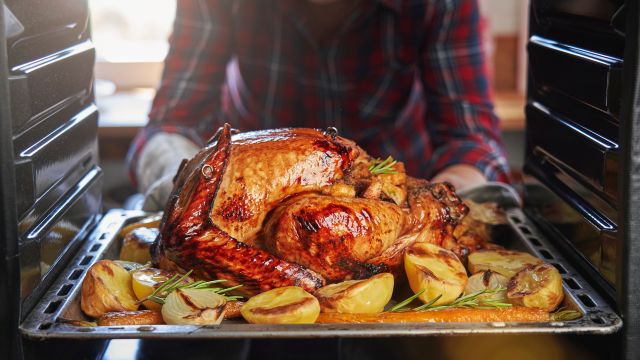Updated on October 19, 2022.
Thanksgiving is a time for gathering with family, reflecting on what’s important, and of course, eating lots of turkey. But if you’re not careful, the star of your holiday dinner table could hurt your health.
Follow these tips for preparing, cooking, and enjoying your bird.
Thaw properly
One of the easiest ways to prevent a Thanksgiving mishap is to make sure your turkey is safely thawed. Not doing so could enable certain bacteria to cause a number of foodborne illnesses, including salmonella. Choose one of these three methods:
- Refrigerator: This method takes the most time, but many experts say it’s the safest. Make sure the fridge’s temperature is 40°F or below. Keep the turkey in its original wrapper and place it in a container to prevent juices from leaking. You should allow 24 hours to thaw for every 4 to 5 pounds of weight.
- Cold water: Keep the turkey in its original packaging to help ensure that it doesn’t leak and to keep bacteria from spreading. Submerge the bird in cold water, making sure to change the water every 30 minutes. Thawing time should take 30 minutes per pound.
- Microwave: Follow the microwave’s defrosting instructions, and plan to cook the bird immediately after microwaving, because some parts of the turkey may already begin to cook during the defrosting process. Waiting to cook may cause bacteria to spread, leading to food poisoning.
Remember: To keep potential bacteria away from other food and to avoid cross contamination, place your turkey in a pan or a leak-proof container.
Prevent grease burns
Deep-fried turkeys have become more popular over the years. As tasty as they are, the contraptions they’re cooked in have caused hundreds of dangerous fires, burns, and even explosions in recent years, according to the United States Consumer Product Safety Commission. Emergency room doctor Mini DeLashaw, MD, PhD, of Medical City Dallas in Texas, says her hospital sees a lot of injuries due to turkey fryers every year. These range from mild burns caused by people dipping their fingers in the fryer to more severe and devastating burns that occur when the fryer topples over.
If you do use a fryer, follow these tips:
- Set up the fryer at least 10 feet away from your home (not on the porch or in the garage).
- Make sure it’s on a flat surface.
- Keep children and pets away.
- Make sure the turkey is dry and thawed.
- Don’t overfill the fryer with oil.
- Have a fire extinguisher ready.
Whether you deep-fry, roast, or grill your turkey, remember that its internal temperature should reach 165°F. Using a meat thermometer, take a reading in three separate places in your bird to make sure.
Carve carefully
Carving up the main course is one of those great holiday traditions, but it doesn’t come without risks. Remember these carving tips to stay safe:
- Never carve toward yourself.
- Make sure your table or carving station is well-lit.
- Only use sharp utensils.
- Never place your hand under the blade.
Watch the sodium
Food is to blame for many heart-related hospital visits around the holidays. A common culprit: super-rich meals loaded with sodium.
“I see a huge spike in admissions related to heart failure,” says cardiologist Marc Krock, MD, of Medical City McKinney in Texas. “On these meal-based holidays, there’s a significant increase in sodium intake, and that has pretty significant ramifications for heart health.”
To stay heart healthy, practice portion control and aim to top out at around 2,300 mg of sodium per day, or about a teaspoon of salt.

